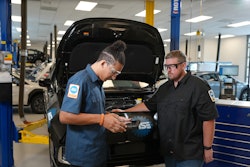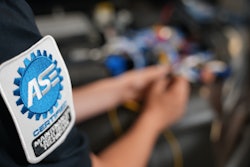
Career and technical education students are roundly impressed by the overwhelming commitment to learning, safety and student experiences shown by instructors in automotive, truck/diesel and collision/ refinishing programs, but wish industry showed a greater willingness to invest the same way, responders indicated in the 2024 and 2025 ASE Education Foundation Student Surveys.
In a series of survey questions where student responders were asked to rate aspects of their career and technical education (CTE), high school and post-secondary students alike offered strong appreciation for instructors and technical educators.
Students may question the support educators receive outside their classrooms and the quality of resources at their disposal, but they don’t doubt their instructors’ commitment to teaching.
This can be seen across ASE’s two surveys, where at least 53% gave a “very good” rating and 85% gave a “good” or “very good” rating to their program in the following categories:
- Instructor’s preparedness and organization.
- Instructor’s ability to help me understand the class material.
- Hands on practice in the lab/ shop directly related to classroom discussion.
- Condition of the building, classroom and lab/shop.
- Adequacy of tools and equipment.
- Emphasis placed on workplace safety and professional work habits.
Students were somewhat less favorable in their assessment of other areas, many of which require support beyond an instructor’s capabilities.
In 2024, less than half of high school and post-secondary students alike offered a “very good” review of their program’s textbooks and training materials. Those numbers improved slightly in 2025 but remained below the categories above.
Students also expressed frustration regarding the vehicles and components in labs used for hands-on instruction. Only 40% of high school students rated them as “very good” across the two survey and post-secondary student assessment was only slightly better at 43% and 46% respectively. Conversely, more 27% of all responders across the two surveys rated their school’s equipment as “OK,” “poor” or “very poor.”
Many also offered context for their responses.
“I think we should have newer cars or cars that are in better condition to work on because most of the ones we have currently have seen better days,” said one 2024 responder.
“Try to get a couple of newer vehicles since most are from the early to mid- 2000s,” said another.
“We need new cars that run and are up to date,” “newer cars to work on,” “newer tools and more new cars to work on,” said more 2024 responders.
Another responder noted the frustration older equipment can cause students.
[RELATED: Partnering for Progress, Part II - ‘Why students choose, or fall into, tech programs’]
“The curriculum materials need to be updated,” the 2024 responder said. “Supplied labs and worksheets require information from cars over 20 years old, and the pages that instruct you on how to click through are outdated enough to be inaccurate with recent software updates. While my instructor ensures we only physically work on cars five years old or newer, the worksheets we have to fill out ask irrelevant questions about older, outdated vehicles.”
Some students even offered suggestions for sourcing those vehicles.
“[If we had] updated and newer cars, we could perform on customer cars and talk to customers about their issues,” another 2024 responder said.
Established outside support is another area where students indicate CTE programs are somewhat lacking.
Among high school responders, only 45% in 2024 and 46% in 2025 said program support from local employers was “very good.” Among post-secondary responders that was slightly higher at 47% and 54%, though each year had at least 20% of responders rate employer support as “OK” or worse.
[RELATED: Prices drop as selectivity rises among used truck buyers]
And CTE students clearly like their courses. Between 54% and 60% of responders across both surveys rated their programs as a maximum 5 on a 1-5 scale, but ASE notes enjoying a course doesn’t guarantee a student has been motivated from a future education or career development perspective.
“One of the most significant resources available to ASE accredited CTE programs is our national network of field managers,” says Virginia Oden, assistant vice president at the ASE Education Foundation. “They are the boots on the ground to assist schools in engaging local industry to help build advisory committees that can talk directly with CTE administrators on program needs. With today’s tight budgets, making sure those limited resources are used in the most effective way is critical to building the successful careers our students choose to pursue.
By facilitating the connections between local industry and ASE accredited programs, field managers help instructors and administrators find the support they need when justifying expenses for the purchase of the tools, equipment and curriculum resources necessary to grow and improve the CTE experience in their school districts.”
“For example, ASE and the ASE Education Foundation have partnered with WrenchWay to promote School Assist as the industry solution connecting vehicle service employers and schools in finding classroom resources and creating a workforce pipeline for the transportation industry,” Oden adds.
“WrenchWay created School Assist to make it easier for high schools and colleges to work with the industry. Schools can use the WrenchWay dashboard to make requests for guest speakers, shop tours, tool donations, internships and more. Shops, dealerships and others can easily scroll through the requests, connect with schools and start a relationship that will build their future workforce from students enrolled in these programs.
School Assist also enables industry members to post available resources for educators, enabling schools to reach out on the platform and collaborate on opportunities that will benefit students and potential employers.”
Next up: Part IV of our special report, ‘What stops tech students from pursuing tech careers.’









